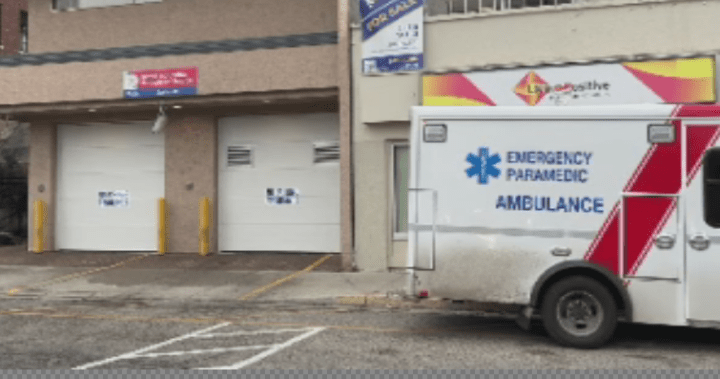A near-fatal attack on a paramedic at a Kelowna ambulance station has sparked urgent calls for increased security measures, highlighting the escalating dangers faced by first responders in areas grappling with homelessness and addiction. The incident, which involved a knife-wielding assailant confronting a paramedic washing an ambulance, underscores the vulnerability of healthcare workers in an environment increasingly characterized by violence and unpredictable encounters. The paramedic narrowly escaped injury by fending off the attacker with a cleaning broom, a chilling reminder of the precarious situations they face daily. This incident has ignited a heated debate about the responsibility of employers to ensure the safety of their staff, particularly in high-risk locations.
The attack, which took place early Tuesday morning, unfolded rapidly as the paramedic was unexpectedly confronted by the armed assailant. The suspect, described as a woman, emerged from behind the ambulance brandishing a four-inch hunting knife, screaming and reportedly uttering threats. The paramedic reacted swiftly, using the broom he was holding as a makeshift shield to deflect the knife thrusts. The quick thinking and defensive maneuver likely saved the paramedic from serious injury or even death. The suspect subsequently fled the scene, evading capture by responding RCMP officers. The incident remains under investigation, with authorities working to identify and apprehend the assailant. This attack has left the paramedic shaken but physically unharmed, a testament to his composure under duress.
The union representing paramedics, Ambulance Paramedics of BC, has vehemently condemned the incident, asserting that it represents a culmination of ongoing safety concerns at the downtown Kelowna station. They argue that the growing prevalence of homelessness and addiction in the area has created a volatile environment, placing paramedics at increased risk of violence. The union has called on BC Emergency Health Services (BCEHS), the employer, to implement immediate and comprehensive safety improvements. They contend that the current security measures are inadequate and that BCEHS has been slow to address these escalating concerns. The union stresses the urgency of the situation, emphasizing that the failure to act decisively could result in serious injury or death of a paramedic.
BCEHS has acknowledged the gravity of the incident, describing it as “frightening” and expressing their commitment to the safety of their staff. They have announced immediate measures, including the deployment of a security company to patrol the site. Furthermore, they have pledged to explore long-term solutions to enhance security at the Kelowna station and across all their facilities province-wide. BCEHS has affirmed their dedication to collaborating with stakeholders to develop and implement effective safety initiatives. However, the union remains skeptical, demanding concrete actions rather than mere assurances. They insist that a comprehensive and sustained approach is required to mitigate the risks faced by paramedics in the line of duty.
This incident has reignited a broader discussion about the safety and well-being of first responders operating in challenging and often dangerous environments. The increasing prevalence of homelessness and addiction in many urban centers has created complex challenges for emergency services personnel, who are frequently called upon to interact with individuals experiencing mental health crises or substance abuse issues. These encounters can be unpredictable and potentially violent, placing first responders at significant risk. The incident in Kelowna highlights the need for a multi-faceted approach to addressing these challenges. This includes providing adequate training and resources for first responders, implementing comprehensive safety protocols, and addressing the root causes of homelessness and addiction.
The attack on the Kelowna paramedic serves as a stark reminder of the dangers faced by those on the front lines of healthcare. It underscores the urgent need for increased security measures, improved training, and a collaborative approach to addressing the complex social issues that contribute to violence against first responders. The union’s call for immediate action reflects a growing concern that the current safety measures are inadequate and that the lives of paramedics are being jeopardized. The incident has sparked a crucial conversation about the responsibility of employers and society as a whole to ensure the safety and well-being of those who dedicate their lives to serving and protecting the community. The hope is that this incident will serve as a catalyst for meaningful change, leading to enhanced safety protocols and a greater appreciation for the sacrifices made by paramedics and other first responders.



